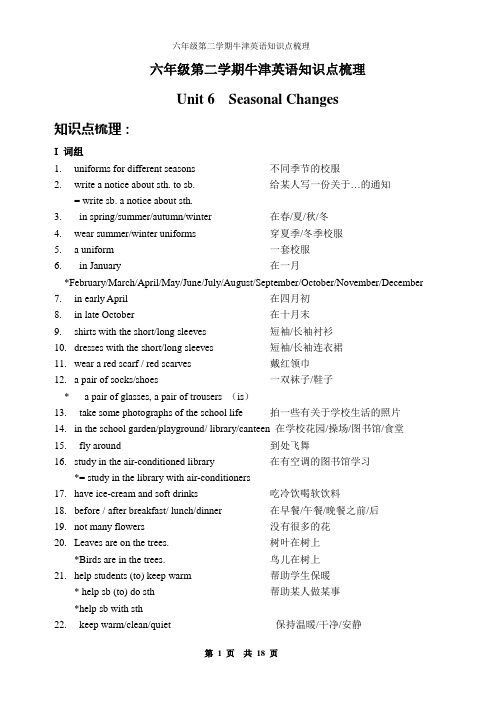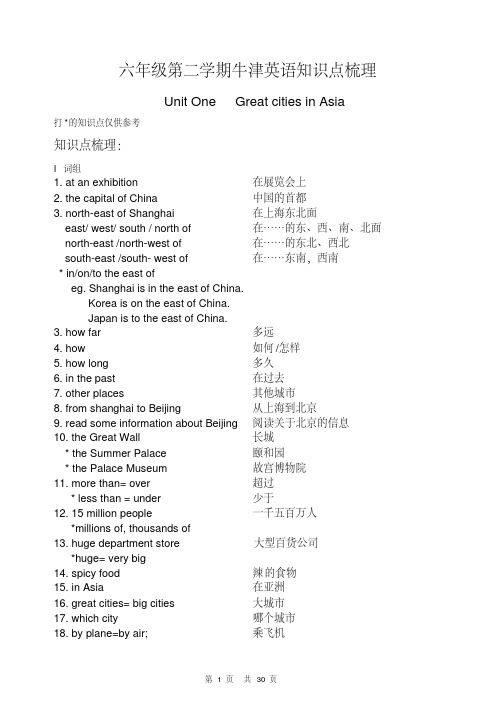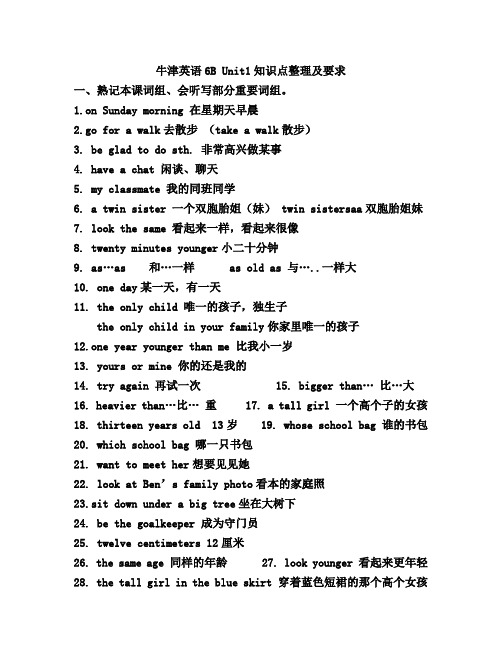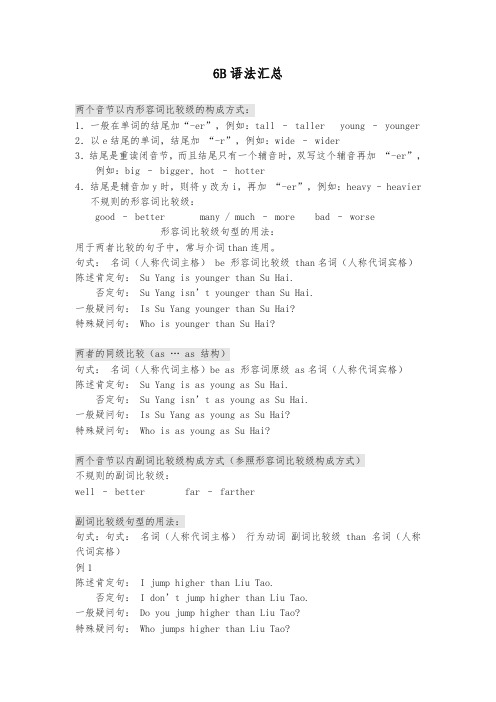牛津小学六年级英语6B语法汇总
牛津6bunit6unit10知识点梳理

六年级第二学期牛津英语知识点梳理Unit 6 Seasonal Changes知识点梳理:I 词组1.uniforms for different seasons 不同季节的校服2.write a notice about sth. to sb. 给某人写一份关于…的通知= write sb. a notice about sth.3.in spring/summer/autumn/winter 在春/夏/秋/冬4.wear summer/winter uniforms 穿夏季/冬季校服5. a uniform 一套校服6.in January 在一月*February/March/April/May/June/July/August/September/October/November/December7.in early April 在四月初8.in late October 在十月末9.shirts with the short/long sleeves 短袖/长袖衬衫10.dresses with the short/long sleeves 短袖/长袖连衣裙11.wear a red scarf / red scarves 戴红领巾12. a pair of socks/shoes 一双袜子/鞋子* a pair of glasses, a pair of trousers (is)13.take some photographs of the school life 拍一些有关于学校生活的照片14.in the school garden/playground/ library/canteen 在学校花园/操场/图书馆/食堂15.fly around 到处飞舞16.study in the air-conditioned library 在有空调的图书馆学习*= study in the library with air-conditioners17.have ice-cream and soft drinks 吃冷饮喝软饮料18.before / after breakfast/ lunch/dinner 在早餐/午餐/晚餐之前/后19.not many flowers 没有很多的花20.Leaves are on the trees. 树叶在树上*Birds are in the trees. 鸟儿在树上21.help students (to) keep warm 帮助学生保暖* help sb (to) do sth 帮助某人做某事*help sb with sth22.keep warm/clean/quiet 保持温暖/干净/安静23.make snowmen (a snowman)堆雪人II. 词性转换1. seasonal (adj.) -- season (n.)There are four seasons in a year.Strawberries are seasonal fruit.2. change ( n. v. ) -- *changeable (adj.)Please change the sentence into English.Here is your change, sir.The weather is very changeable in Tibet.3. shorts ( n.)--short ( adj.)Boys must wear shorts and T-shirts in summer.In summer, the days are long and the nights are short.可数:*生命save my life *lives (pl.)4. life n.不可数:生活school lifelive (v.)*living adj. (定语) *alive adj. (表语)The farmer and his wife live happily in their hut and they enjoy their happy life very much.The hero who has saved his life is still alive.5. air-conditioned (adj.) air-conditioner (n.)The library isn’t air-conditioned now because there is something wrong with the air-conditioner.III. 语言点/句型1. Boys must wear white shirts with the short sleeves.2. Many flowers grow in the garden.3. Not many students like playing in the playground because it’s hot.Unit 7 Travelling in Garden City知识点梳理:I 词组:1.traveling in Garden City 花园城的出行2.travelling by bus∕ferry∕underground 乘公共汽车/渡船/地铁出行3. a single-decker bus 一辆单层汽车4. a double-decker bus 一辆双层汽车5. a fare box 一个投币箱6. a public transportation card 一张公共交通卡7.an air-conditioned bus 一辆空调车8.in the past 在过去9.in 10 years’ time 十年后10.all passengers 所有的乘客11.buy tickets from 从……买票12.collect money from the passengers 从乘客那里收钱13.have to do sth.(don’t have to do sth.) 不得不;必须(不必)14.put their money in a fare box 把钱放进投币箱e sth. instead 用……替代16.all of 全部的……17.most of 大部分的……18.some of 一些……19.none of 没有一个……20.be like 像……21.fewer traffic jams 少一些交通阻塞22.more underground stations 更多的地铁站23.light rail 轻轨24.traffic lights 交通灯25.car parks 停车场26.discuss sth. with sb. 和…讨论27.*think about 考虑;思考;想一想28.*kinds of transport 交通方式29.*make a poster about 制作一张有关……的海报II. 词性转换1. travel v. 旅行—travelling n. 交通—﹡traveller n. 旅行者e.g. Travelling in Shanghai will be more and more convenient.The Bund attracts many travelers to take photos there.2. conductor n. 售票员—*conduct v. 指挥,进行e.g. The manager asked him to conduct the meeting3. collect v. 收集—collection n. 收集e.g. Mr. Grey is interested in art and he has a large collection of paintings.4. driver n. 司机—drive v. 驾驶e.g. My father drives me to school every day.5. crossing n. 十字路口—cross v. 穿过—across prep. 越过e.g. Don’t cross the road when the traffic light is red.The old lady was walking across the road carefully.6. discuss v. 讨论—discussion n. 讨论e.g. We had a discussion on language and communication7. air-conditioned adj. 有空调设备的—air-conditioner n. 空调e.g. He's going to install an air-conditioner in the house.8. park v. 停车—park n. 公园/停车库e.g. I have to look for a car park to park my car.9. little adj. 很少的—less (比较级) 更少的e.g. He promised to have less fast food to keep healthy.10. few adj. 很少的—fewer (比较级) 更少的e.g. Helen made a few mistakes in her test paper. But Jane made fewer than her.11. many ∕much adj. 许多的—more (比较级) 更多的e.g. Nowadays you can find more tall buildings in Shanghai.III. 语言点/句型1. What will travelling in our city be like in 10 years’ time?=How will travelling in our city be in 10 years’ time?What …be like? …怎么样?be like∕look like 中like prep. 像…一样e.g. Our school is like a garden. like prep. 像…一样She looks like her mother.He likes reading detective stories, like v. 喜欢2. in 10 year s’ time =in 10 years 十年后(常与一般将来时连用)◆in one year’s time◆用How soon 提问e.g. The young man will finish riding around the country in two years’ time.How soon will the young man finish riding around the country?3. there be 句型表示事物的存在在什么地方有什么一般现在时:There is∕are一般过去时:There was∕were一般将来时:There will be/ There is going to be4. all of∕most of∕some of∕none of◆all of∕most of∕some of做主语时,后面的名词为复数,谓语动词也为复数e.g. All of the students wear school uniforms.◆none of做主语时,既可用复数谓语动词,也可用单数谓语动词e.g. None of us enjoy(s) getting up early.﹡复习one of的用法﹡可补充与both of∕either of∕neither of 的比较5. in the past∕nowadays∕in 10 years’ time分别与一般过去时,一般现在时,一般将来时连用e.g. In the past, people usually went to work by bike.Nowadays, people go to work by underground.In 10 years’ time, people will drive to work themselves.6. 比较级:little—less, few—fewer, many∕much—more◆fewer traffic jams∕less traffic7. have to do 不得不◆否定形式:don’t have to do = needn’t do∕don’t need to do 不需要e.g. I have to stay at home. I don’t have to stay at home.◆和must 的区别have to do —强调客观的需要,有人称,时态的变化must —强调主观的意愿,没有人称,时态的变化e.g. He broke his leg, so he had to lie in bed for several days.She must study hard, because she wants to be a doctor.8. perhaps= maybe, possibly 也许,可能9. travel by bus=take a bustravel by underground= take the underground10. instead和instead of◆instead单独用于句首句尾,是副词◆instead of 用于名词,代词或介词短语前e.g. I don’t like the red one, give me the black one instead.= Give me the black one instead of the red one.11. transportation n. (美)= transport n.(英)交通工具12. 动词与介词的搭配buy … from从…买collect … from从…收集put … in把…放入13. a woman driver— five wom e n driver sa man teacher— two m e n teacher s*a girl student — some girl studentsUnit 8 Windy weatherI 词组1.windy weather 有风的天气2.different kinds of 不同种类的3.make a display board 制作一个展板4. a gentle wind 一阵柔和的风5. a strong wind 一阵大风6. a typhoon 一阵台风7.see sb. doing sth 看见某人正做某事8.fly kites in the park 在公园里放风筝9.hold raincoats tightly 紧紧地抓住雨衣10.leaves blow slightly 树叶微微地吹动11.fly in the sky 在空中飞扬12.take flower pots into flats 把花盆拿进房间13.clouds move quickly 云快速地移动14.windsurf on the sea 在海上进行帆板运动15.on a windy day 在一个有风的日子16.fly kites happily 快乐地放风筝17.at first 起先18.blow gently 柔和地吹19.move slowly 缓慢地移动20.become stronger (风)变得更大了21.blow sth. away 吹走某物22.go home immediately 立刻回家23.blow fiercely 猛烈地吹24.fall down 倒下25.sink in the sea 在海里下沉26.pass quickly 快速地经过27.walk carefully in the street 街上小心地行走28.clean the street 清扫街道29.a slide show about typhoons 一个关于台风的幻灯片30.heavy objects 重物31.fall on cars 落在小汽车上32.break windows 打破玻璃窗33.flower pots outside people’s flats 人们屋外的花盆34.big waves in the sea 海里的大浪35.think about 思考;考虑36.may happen 可能发生37.when there is a typhoon 当有台风的时候38.sink ships and boats 沉没船只39.safety rules 安全规则40.stay at home 待在家中41.close all the windows 关闭所有的窗42.park cars in car parks把汽车停在停车场里43.fishing boats 渔船44.stay in typhoon shelters 待在台风庇护所里II. 词性转换1. windy a. 有风的wind n. 风windy weather/ days a gentle/ strong wind2. gentle a. 温和的gently ad. 温和地He is a gentle person.She gave me a gentle push.3. tightly ad. 紧紧地tight a. 紧紧的She kept her eyes tightly closed.You must hold the bottle tightly.4. slightly ad. 轻微地slight a. 轻微的The leaves blow slightly in the parksI know about him slightly.5. cleaner n. 清洁工人clean a. 干净的v. 清洁They saw some street cleaners cleaning the street.6. happily ad. 愉快地happy a. 快乐的happiness n. 快乐Kitty and Ben flew their kite happily.John lives happily because he always uses his time well for study.7. slowly ad. 缓慢地slow a. 缓慢的The clouds moved slowlyThe sky changed slowly from blue to red.反义quickly/ fast ad. 迅速地8. quickly ad. 迅速地quick a. 迅速的The clouds moved quickly.9. immediately ad. 立即immediate a. 立即的Kitty and Ben went home immediately.Stop smoking immediately.10. fiercely ad. 猛烈地fierce a. 猛烈的The wind became a typhoon and blew fiercely.11. carefully ad. 小心地careful a. 小心的,仔细的*care n./ v. 关心Please listen carefully and write down the sentences.反义carelessly ad. 不注意地,粗心地12. heavy a. 沉重的heavily ad. 沉重地13. safety n. 安全safe a. 安全的*safely ad. 安全地safety rulesmake our city a safe placearrive at home safely14. inside(反义)—outside15. fish n. 鱼v. 捕鱼fisherman ( fishermen) n.(复数) 渔民III. 语言点/句型1. What can you see when there is a gentle wind?有微风的日子里你能看到些什么?when,连词,意为“当……时” ,引导时间状语从句。
上海牛津英语六年级第二学期6B英语知识点汇总U1-U9

上海⽜津英语六年级第⼆学期6B英语知识点汇总U1-U9六年级第⼆学期⽜津英语知识点梳理Unit One Great cities in Asia打*的知识点仅供参考知识点梳理:I 词组1. at an exhibition 在展览会上2. the capital of China 中国的⾸都3. north-east of Shanghai 在上海东北⾯east/ west/ south / north of 在……的东、西、南、北⾯north-east /north-west of 在……的东北、西北south-east /south- west of 在……东南,西南* in/on/to the east ofeg. Shanghai is in the east of China.Korea is on the east of China.Japan is to the east of China.3. how far 多远4. how 如何/怎样5. how long 多久6. in the past 在过去7. other places 其他城市8. from shanghai to Beijing 从上海到北京9. read some information about Beijing 阅读关于北京的信息10. the Great Wall 长城* the Summer Palace 颐和园* the Palace Museum 故宫博物院11. more than= over 超过* less than = under 少于12. 15 million people ⼀千五百万⼈*millions of, thousands of13. huge department store ⼤型百货公司*huge= very big14. spicy food 辣的⾷物15. in Asia 在亚洲16. great cities= big cities ⼤城市17. which city 哪个城市18. by plane=by air; 乘飞机by ship=by sea; 乘船by train/ ferry 乘⽕车/ 渡轮19. That’s right. 对的。
(完整版)上海版牛津英语六年级下册6B重点知识点复习整理(最新整理)

(完整版)上海版牛津英语六年级下册6B重点知识点复习整理(最新整理)上海版牛津英语六年级下册6B重点知识点复习整理Module 1 City LifeUnit 1 Great cities in Asia【知识点梳理】1.方位词:east / west / north / south / north-east / north-west / south-east / south-west用法:a. 两地不相邻: e.g. A is north B. (= to the south of)b. 两地接壤: e.g. A is on the north of B.c. 所属关系,A包含B, B属于A: e.g. B is in the north of A.2. by + 交通工具表示“乘……交通工具”, 用how进行提问e.g. by bus / ferry / train / ship / underground… by plane = by air, by ship = by sea3. How far…多远(询问距离的远近,路程的长短)e.g. Hoe far is it from your home to school? 从你家到学校有多远?4. How long…多长,多久(询问时间的长短,提问一段时间)e.g. How long does it take to travel from Shanghai to Beijing by train? 坐火车从上海到北京要花多长时间?5. It takes (sb.) some time to do sth. 做某事需要花费多少时间e.g. It takes me five hours to make this modal plane. 做这个模型飞机花了我5个小时。
6. like / love / enjoy doing sth. 喜欢做某事e.g. The people in Bangkok like / love / enjoy eating spicy food. 曼谷人喜欢吃辛辣食物。
(直打版)上海牛津英语六年级第二学期6B英语知识点汇总U1U9

6: 关于“半个的表达法" half an hour (半小时) one hour and a half (一个半小时) an hour and a half
多久
6. in the past
在过去
7。 other places
其他城市
8。 from shanghai to Beijing
从上海到北京
9。 read some information about Beijing 阅读关于北京的信息
10。 the Great Wall
长城
* the Summer Palace
21. like visiting those places 喜欢参观那些地方
like/ love/ enjoy/ doing Sth.
would like to do Sth.
22. in Tokyo
在东京
II。 词性转换
1。 Japan (n.) 日本 — Japanese ( a。/n. )日本的,日语,日本人
(直打版)上海牛津英语六年级第二学期 6B 英语知识点汇总 U1-U9(word 版可编辑修改)
eg. Tokyo is east of Shanghai. Shanghai is in the east of China。 Beijing is north of Shanghai. It is also in the north of China。
颐和园
第 2 页 共 49 页
(直打版)上海牛津英语六年级第二学期 6B 英语知识点汇总 U1-U9(word 版可编辑修改)
上海牛津英语六年级第二学期6B英语知识点汇总U1-U9,推荐文档(20200614111707)

六年级第二学期牛津英语知识点梳理Unit One Great cities in Asia打*的知识点仅供参考知识点梳理:I 词组1. at an exhibition 在展览会上2. the capital of China 中国的首都3. north-east of Shanghai 在上海东北面east/ west/ south / north of 在……的东、西、南、北面north-east /north-west of 在……的东北、西北south-east /south- west of 在……东南,西南* in/on/to the east ofeg. Shanghai is in the east of China.Korea is on the east of China.Japan is to the east of China.3. how far 多远4. how 如何/怎样5. how long 多久6. in the past 在过去7. other places 其他城市8. from shanghai to Beijing 从上海到北京9. read some information about Beijing 阅读关于北京的信息10. the Great Wall 长城* the Summer Palace 颐和园* the Palace Museum 故宫博物院11. more than= over 超过* less than = under 少于12. 15 million people 一千五百万人*millions of, thousands of13. huge department store 大型百货公司*huge= very big14. spicy food 辣的食物15. in Asia 在亚洲16. great cities= big cities 大城市17. which city 哪个城市18. by plane=by air; 乘飞机by ship=by sea; 乘船by train/ ferry 乘火车/ 渡轮19. That’s right. 对的。
牛津英语6B单元知识点整理及要求

牛津英语6B Unit1知识点整理及要求一、熟记本课词组、会听写部分重要词组。
1.on Sunday morning 在星期天早晨2.go for a walk去散步(take a walk散步)3. be glad to do sth. 非常高兴做某事4. have a chat 闲谈、聊天5. my classmate 我的同班同学6. a twin sister 一个双胞胎姐(妹) twin sistersaa双胞胎姐妹7. look the same 看起来一样,看起来很像8. twenty minutes younger小二十分钟9. as…as 和…一样 as old as 与…..一样大10. one day某一天,有一天11. the only child 唯一的孩子,独生子the only child in your family你家里唯一的孩子12.one year younger than me 比我小一岁13. yours or mine 你的还是我的14. try again 再试一次 15. bigger than…比…大16. heavier than…比…重 17. a tall girl 一个高个子的女孩18. thirteen years old 13岁 19. whose school bag 谁的书包20. which school bag 哪一只书包21. want to meet her想要见见她22. look at Ben’s family photo看本的家庭照23.sit down under a big tree坐在大树下24. be the goalkeeper 成为守门员25. twelve centimeters 12厘米26. the same age 同样的年龄 27. look younger 看起来更年轻28. the tall girl in the blue skirt 穿着蓝色短裙的那个高个女孩二、初步理解掌握本课语法知识。
牛津小学英语六年级英语6B语法汇总

6B语法汇总两个音节以内形容词比较级的构成方式:1.一般在单词的结尾加“-er”,例如:tall – taller young – younger 2.以e结尾的单词,结尾加“-r”,例如:wide – wider3.结尾是重读闭音节,而且结尾只有一个辅音时,双写这个辅音再加“-er”,例如:big – bigger, hot – hotter4.结尾是辅音加y时,则将y改为i,再加“-er”,例如:heavy –heavier 不规则的形容词比较级:good – better many / much – more bad – worse形容词比较级句型的用法:用于两者比较的句子中,常与介词than连用。
句式:名词(人称代词主格) be 形容词比较级 than名词(人称代词宾格)陈述肯定句: Su Yang is younger than Su Hai.否定句:Su Yang isn’t younger than Su Hai.一般疑问句: Is Su Yang younger than Su Hai?特殊疑问句: Who is younger than Su Hai?两者的同级比较(as … as 结构)句式:名词(人称代词主格)be as 形容词原级 as名词(人称代词宾格)陈述肯定句: Su Yang is as young as Su Hai.否定句:Su Yang isn’t as young as Su Hai.一般疑问句: Is Su Yang as young as Su Hai?特殊疑问句: Who is as young as Su Hai?两个音节以内副词比较级构成方式(参照形容词比较级构成方式)不规则的副词比较级:well – better far – farther副词比较级句型的用法:句式:句式:名词(人称代词主格)行为动词副词比较级 than名词(人称代词宾格)例1陈述肯定句: I jump higher than Liu Tao.否定句:I don’t jump higher than Liu Tao.一般疑问句: Do you jump higher than Liu Tao?特殊疑问句: Who jumps higher than Liu Tao?例2陈述肯定句: Liu Tao runs faster than me.否定句:Liu Tao doesn’t run faster than me.一般疑问句: Does Liu Tao run faster than you?特殊疑问句: Who runs faster than you?be going to (do sth.) 打算做某事1)表示现在的意图,即打算在最近或将来进行某事,例如:We are going to post the letter.2)表示现在已有迹象表明将要发生或即将发生某种事态,例如:I must hurry, I’m going to be late.(常与tomorrow, next week, next year等将来时间连用)用法:陈述肯定句:We are going to give a puppet show next week.否定句:We aren’t going to give a puppet show next week.一般疑问句:Are you going to give a puppet show next week? 特殊疑问句:Who is going to give a puppet show next week?What are you going to do next week?。
牛津小学英语六年级6B知识点汇总

牛津小学英语六年级6B知识点汇总Unit 1Who is younger?一、单词:**** than 比,chat聊天,young年轻的old年老的strong 强壮的fat 胖的thin 瘦的heavy 重的light 轻的short短的、矮的long 长的tall高的small小的big大的sit(sat)坐meet(met)遇见、见面***twin (双胞胎)之一as 作为minute 分钟only惟一的、仅有的child孩子(children孩子们)little小的cute 伶俐的、可爱的also 也**centimetre 厘米height身高 weight体重worm蠕虫二、词组:1.on Sunday morning 在星期天早晨2.go for a walk 去散步3. look the same 看起来一样4. one day 某一天5.as tall as 与…..一样高as fat as 与…..一样胖as long as 与….一样长6. shorter than…比….矮bigger than比…大heavier than比…重7. twenty minutes younger小二十分钟 8.one year older 大一岁9.sit down under a big tree 坐在大树下 10.be glad to do 非常高兴做某事11.see them/him/you 看见他们/他/你 12.look different 看起来不同13.a twin sister 双胞胎姐妹 14.my classmate/deskmate我的同班同学/同桌15.how old 多大16.the only child 仅有的一个孩子17.a cute little dog一只可爱的小狗 18.get a brother 得了个弟弟19.a tall boy 一个高个子的男孩 20.a young teacher 一位年轻的教师21.some heavy boxes 一些重的盒子 22.whose classroom 谁的教室23.your old friend(s) 你的老朋友 24.a heavy schoolbag 一只重的书包25.a strong goalkeeper 一个强壮的守门员26.brothers and sisters 兄弟姐妹27.the girl in red 穿红衣服的女孩 28.yours or mine 你的还是我的29.look young 看起来年轻 30.have a chat 聊天、闲谈31.asksome queations问一些问题三、形容词比较级:A.直接加er/rtall---________light----________young--_________old---________strong--___ small--_________late---_________long---_________short--________B.双写加er big-------_________ fat-----_________ thin---________C.去y改i加er heavy---_________四、句型:1、Who’s younger than him ?谁比他年轻?My brother is younger than him . 我弟弟比他年轻。
- 1、下载文档前请自行甄别文档内容的完整性,平台不提供额外的编辑、内容补充、找答案等附加服务。
- 2、"仅部分预览"的文档,不可在线预览部分如存在完整性等问题,可反馈申请退款(可完整预览的文档不适用该条件!)。
- 3、如文档侵犯您的权益,请联系客服反馈,我们会尽快为您处理(人工客服工作时间:9:00-18:30)。
6B语法汇总
两个音节以内形容词比较级的构成方式:
1.一般在单词的结尾加“-er”,例如:tall – taller young – younger
2.以e结尾的单词,结尾加“-r”,例如:wide – wider
3.结尾是重读闭音节,而且结尾只有一个辅音时,双写这个辅音再加“-er”,例如:big – bigger, hot – hotter
4.结尾是辅音加y时,则将y改为i,再加“-er”,例如:heavy – heavier 不规则的形容词比较级:
good – better many / much – more bad – worse
形容词比较级句型的用法:
用于两者比较的句子中,常与介词than连用。
句式:名词(人称代词主格)be 形容词比较级than名词(人称代词宾格)陈述肯定句:Su Yang is younger than Su Hai.
否定句:Su Yang isn’t younger than Su Hai.
一般疑问句:Is Su Yang younger than Su Hai?
特殊疑问句:Who is younger than Su Hai?
两者的同级比较(as … as 结构)
句式:名词(人称代词主格)be as 形容词原级as名词(人称代词宾格)
陈述肯定句:Su Yang is as young as Su Hai.
否定句:Su Yang isn’t as young as Su Hai.
一般疑问句:Is Su Yang as young as Su Hai?
特殊疑问句:Who is as young as Su Hai?
两个音节以内副词比较级构成方式(参照形容词比较级构成方式)
不规则的副词比较级:
well – better far – farther
副词比较级句型的用法:
句式:句式:名词(人称代词主格)行为动词副词比较级than名词(人称代词宾格)
例1
陈述肯定句:I jump higher than Liu Tao.
否定句:I don’t jump higher than Liu Tao.
一般疑问句:Do you jump higher than Liu Tao?
特殊疑问句:Who jumps higher than Liu Tao?
例2
陈述肯定句:Liu Tao runs faster than me.
否定句:Liu Tao doesn’t run faster than me.
一般疑问句:Does Liu Tao run faster than you?
特殊疑问句:Who runs faster than you?
be going to (do sth.) 打算做某事
1)表示现在的意图,即打算在最近或将来进行某事,例如:
We are going to post the letter.
2)表示现在已有迹象表明将要发生或即将发生某种事态,例如:
I must hurry, I’m going to be late.
(常与tomorrow, next week, next year等将来时间连用)
用法:
陈述肯定句:We are going to give a puppet show next week.
否定句:We aren’t going to give a puppet show next week.
一般疑问句:Are you going to give a puppet show next week?
特殊疑问句:Who is going to give a puppet show next week?
What are you going to do next week?
本卷由《100测评网》整理上传,专注于中小学生学业检测,练习与提升.
===========================================================
适用版本:
人教版,苏教版, 鲁教版,北京版,语文A版,语文S版,冀教版,沪教版,北大师大版,人教版新版,外研版,新起点,牛津译林,华师大版,湘教版,新目标,苏科版,粤沪版,北京版,岳麓版
适用学科:
语文,数学,英语,科学,物理,化学,生物,政治,历史,地理
适用年级:
一年级,二年级,三年级,四年级,五年级,六年级,七年级,八年级,九年级,小一,小二,小三,小四,小五,小六,初一,初二,初三,高一,高二,高三,中考,高考,小升初
适用领域及关键字:
100ceping,51ceping,52ceping,ceping,xuexi,zxxx,zxjy,zk,gk,xiti,教学,教学研究,在线教学,在线学习,学习,测评,测评网,学业测评, 学业测评网,在线测评, 在线测评网,测试,在线测试,教育,在线教育,中考,高考,中小学,中小学学习,中小学在线学习,试题,在线试题,练习,在线练习,在线练习,小学教育,初中教育,高中教育,小升初复习,中考复习,高考复习,教案,学习资料,辅导资料,课外辅导资料,在线辅导资料,作文,作文辅导,文档,教学文档,真题,试卷,在线试卷,答案,解析,课题,复习资料,复习专题,专项练习,学习网,在线学习网,学科网,在线学科网,在线题库,试题库,测评卷,小学学习资料,中考学习资料,单元测试,单元复习,单元试卷,考点,模拟试题,模拟试卷,期末考试,期末试卷,期中考试,期中试卷
===========================================================
本卷由《100测评网》整理上传,专注于中小学生学业检测,练习与提升.。
